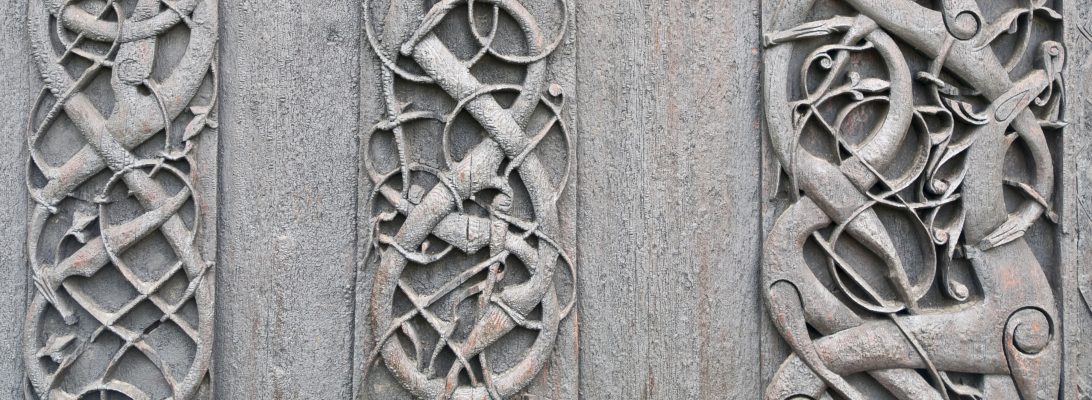Darkness surrounds me; it’s too dark.
I know it is dawn, for ever since I could remember, I’ve opened my eyes at first light to watch the horizon turn color as the sun rose and burned away the mists over the village. At this moment, I remember one morning in particular – waking in my mother’s arms and listening to her heartbeat as she continued to sleep, though I grew restless and wanted to be free of her embrace, to go out and play in the stream, to watch the cattle and chase the hens. I would think it a blessing to hear her voice now, to be caught in that embrace. I relax and pull images from my memory, piecing together our house and shop, hearing the sounds of morning. It doesn’t help, for suddenly I am afraid, and it is so very dark.
I feel… strangely – something does not belong, does not fit.
I feel as if I’m suffocating.
Something is caught around my nose and mouth, choking me. There is a glazing over my eyes – I see, but I do not see, everything is in a fog. My hands feel cold; I can’t move my feet. I remember, and yet I do not. The comforting images from home are replaced with more disturbing things. I see people, and hear their voices; I see the streets crowded with people, soldiers. There is heaviness and lightness. My heart beats frantically with every breath I try to take, and I see… things. They are those I do not wish to see, but I see them nevertheless.
I remember now.
It is the third day.
“Thank you, Father!”
The words of the prophets came to me in that moment; the dampness of tears soaks the shroud. “So now, O Israel, what does the LORD your God require of you? Only to fear the LORD your God, to walk in all his ways, to love him, to serve the LORD your God with all your heart and with all your soul!”
It is with difficulty I unwind the shroud; it is like peeling an apple — the linen bands spiral and weave as they slide onto the bier.
Sitting up, I reach for the cloth someone has left on the ground and I wrap myself in it, for suddenly I am cold and shivering.
A pale light slides under a crack in the opening of this place. Jumping down, my feet ache a bit and I notice the wounds. Looking at the marks, I remember all of it now. As I reach out to find the opening in the place, I notice the ragged sore on my right hand. How the dim light shines through it! In my mind’s eye, I see the soldier’s face as he plies hammer and nail. For a moment, I feel sick and am near to fainting.
“Hear O, Israel! The Lord is your God!”
I summon strength from the Father and push away the stone blocking the entrance to Joseph’s tomb. The daylight startles me and I stagger a bit, shielding my eyes. It is only a moment until I can focus and look upon the garden. Someone had started to till the soil, for a rake leans against the tomb and new plants are set out in neat rows, waiting. In time, they would yield much fruit.
My presence does not startle the laborers in the garden; they merely turn and nod a good morning. They expect me; they are the Father’s messengers. One of them offers a smile, and I remember his face from my childhood – a serene look with dark eyes that were merry, knowing. I take in a long breath of good morning air tinged with earth and flower scent, and look about again, running a hand along my arm, just to be sure.
A tunic dangles from the handle of the rake, and I take the garment and draw it over my head. It smells freshly washed, of the wind and wildflowers, like those at home. I pick up the rake and begin tilling the soil, humming a song from childhood. It is all so natural, so right, to do this.
The sun has barely moved over the horizon when I see her open the garden gate.
She is draped in mourning weeds, which I think strange at first, and again, I remember. The friend of my childhood and sister in my work, the widow of my friend, she had seen what happened three days ago. She was a witness to the humiliation, the suffering, all that I did because the Father asked me. I am ready to call her name, but the laborers turn as if they know what I am about and shake their heads, smiling.
Mary comes to the tomb and stops short. She drops the jar of spices she balances on a neatly folded stack of linens in her arms, and chokes back a sob.
“My Lord, where have they taken you?” she weeps. “The Romans! Peter was right! Oh why is he always right?”
One of the laborers leans on his shovel and asks, “Woman, why do you weep?”
Mary looks up, frightened. Yet I know Mary; that fear won’t last, just as that day when the wolf came into the town and she alone chased it out; when her husband took the plague and she alone nursed him to his last breath, and everyone had fled. When people told her she was a fool to give her inheritance to us to support our work, to leave her husband’s people in Magdala to follow me.
Time passes before she gathers herself and says, “They’ve taken my Lord, and I don’t know where they’ve laid him!” She dries her tears with the hem of her shawl. “Please sir, if you know, you will tell me. He was my friend.”
“Why do you seek him among the dead, when he is among the living?”
The laborer’s question distresses her even more, and she glances about frantically, bringing a new flood of tears, and I think it is too much for anyone to bear. I shake my head at the laborer and step forward.
“Mary!”
She looks up, and her face is transformed. The grayness of mourning is replaced by radiance. She stumbles on her robes as she comes at me, arms extended for an embrace. I don’t know what to do. As much as I want to return an embrace from a friend, something deep within me says, ‘No! Not yet.’
I was… yet I… wasn’t.
“Rabbouni!” she exclaims.
I step back and kneel so that we are eye to eye. “Touch me not, Mary; for I have not returned to my Father.”
“The prophecies are fulfilled. I did not dare hope – and yet, it has all been brought about as you said! You kept your promise!”
“Mary, go to my brothers and the disciples, to Peter and John, and tell them what you have seen,” I say.
“They won’t believe me! I can hear them now….”
“I’ve given you a mustard seed. Just go, and see what happens. Tell them that I am ascending to my Father, your Father, to my God and your God. I will see all of you in Jerusalem.”
Mary reaches out to take my hands, and from the look on her face, I know she has seen the wounds. They hold her attention for some time, until a peaceful understanding settles on her and she draws back her hands, nodding. When she looks at me, it is the Mary of our childhood, the Mary who fed and clothed my friends and me. She wipes her tears on her sleeve; a smile forms on her lips, and she nods again. Slowly, meticulously, she picks up the shards from the pottery jar and pushes the costly spices to the side of the path, then takes the linens and folds them, setting them aside, knowing they would be of no use here.
“This is the Lord’s doing, and marvelous in our eyes!” she whispers.
When at last she gets to her feet, she walks to the tomb and goes in, as if to make sure, then returns, smiling. She hurries away, and as she closes the garden gate behind her, she turns, looking back. I raise my hand and watch as she disappears between the olive trees, going down the hill to Jerusalem.
The laborers, who have watched all with great interest, now return to their work. It is some time before I move, for I delight in taking in the warm rays of the sun on my face, the sound of a bird greeting the new day. There is still much I have to do, but the garden is compelling. I take up the plants one by one and carefully place them in the rows I have tilled, patting soil about them and offering a trickle of water. Yes, in a year, perhaps less, each of these will yield good fruit.
When I am done with this work, I will go to Jerusalem.
Copyright 2009, 2010, 2025, by Ellen L. Ekstrom. Do not use or quote without the author’s permission.

